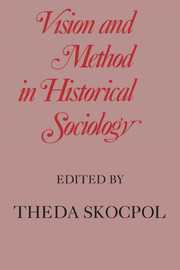Book contents
- Frontmatter
- Contents
- Preface
- 1 Sociology's Historical Imagination
- 2 The Social and Historical Landscape of Marc Bloch
- 3 Beyond the Economistic Fallacy: The Holistic Social Science of Karl Polanyi
- 4 Configurations in History: The Historical Sociology of S. N. Eisenstadt
- 5 Theoretical Generalization and Historical Particularity in the Comparative Sociology of Reinhard Bendix
- 6 Destined Pathways: The Historical Sociology of Perry Anderson
- 7 E. P. Thompson: Understanding the Process of History
- 8 Charles Tilly's Collective Action
- 9 The World System of Immanuel Wallerstein: Sociology and Politics as History
- 10 Discovering Facts and Values: The Historical Sociology of Barrington Moore
- 11 Emerging Agendas and Recurrent Strategies in Historical Sociology
- An Annotated Bibliography on Methods of Comparative and Historical Sociology
- Notes on the Contributors
9 - The World System of Immanuel Wallerstein: Sociology and Politics as History
Published online by Cambridge University Press: 05 June 2012
- Frontmatter
- Contents
- Preface
- 1 Sociology's Historical Imagination
- 2 The Social and Historical Landscape of Marc Bloch
- 3 Beyond the Economistic Fallacy: The Holistic Social Science of Karl Polanyi
- 4 Configurations in History: The Historical Sociology of S. N. Eisenstadt
- 5 Theoretical Generalization and Historical Particularity in the Comparative Sociology of Reinhard Bendix
- 6 Destined Pathways: The Historical Sociology of Perry Anderson
- 7 E. P. Thompson: Understanding the Process of History
- 8 Charles Tilly's Collective Action
- 9 The World System of Immanuel Wallerstein: Sociology and Politics as History
- 10 Discovering Facts and Values: The Historical Sociology of Barrington Moore
- 11 Emerging Agendas and Recurrent Strategies in Historical Sociology
- An Annotated Bibliography on Methods of Comparative and Historical Sociology
- Notes on the Contributors
Summary
Few American sociologists have succeeded in forming academic cults around themselves, and until recently none had ever done so through the writing of social history. Yet this is precisely what Immanuel Wallerstein has done, and it is worth examining the reasons for this before discussing his intellectual biography and analyzing the substance of his work.
Although known as an Africanist in the 1960s and as the author of a provocative book about universities that was sympathetic to the student rebels of the late 1960s, Wallerstein did not achieve great prominence until the publication in 1974 of The Modern World-System: Capitalist Agriculture and the Origins of the European World Economy in the Sixteenth Century. This book was an attempt to create a new grand synthesis of the economic and social history of European expansion from the fifteenth to the early seventeenth centuries.
The basis of Wallerstein's synthesis was the idea that whatever small technological and organizational advantage Western, particularly northwestern, Europe may have possessed at the end of the fifteenth century, it was turned into a much greater superiority by the West's exploitation of non-Western peripheries. Peripheral areas were primary product-exporting regions, at first in Eastern Europe and South America, whose economies and societies were subordinated by the power of the Western (or core) states arms and markets.
- Type
- Chapter
- Information
- Vision and Method in Historical Sociology , pp. 276 - 312Publisher: Cambridge University PressPrint publication year: 1984
- 26
- Cited by



